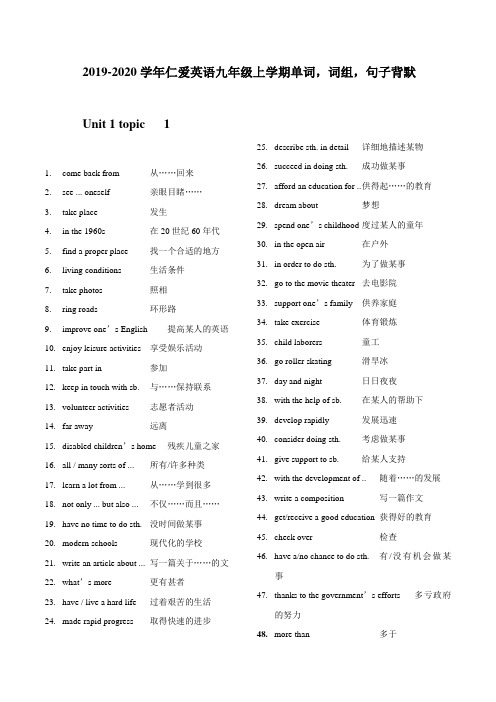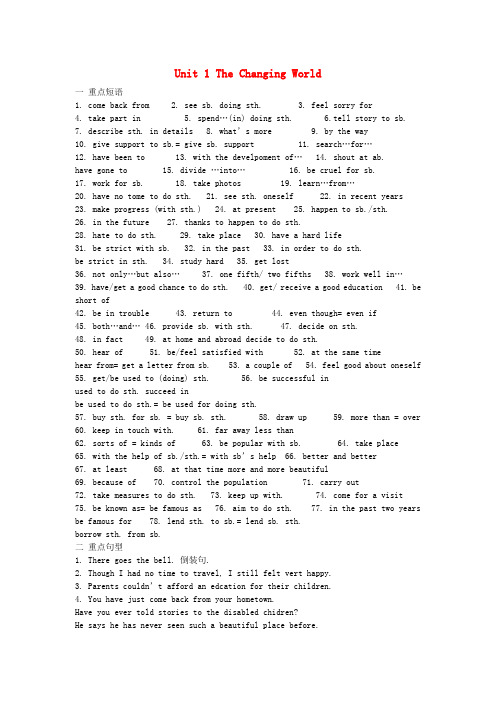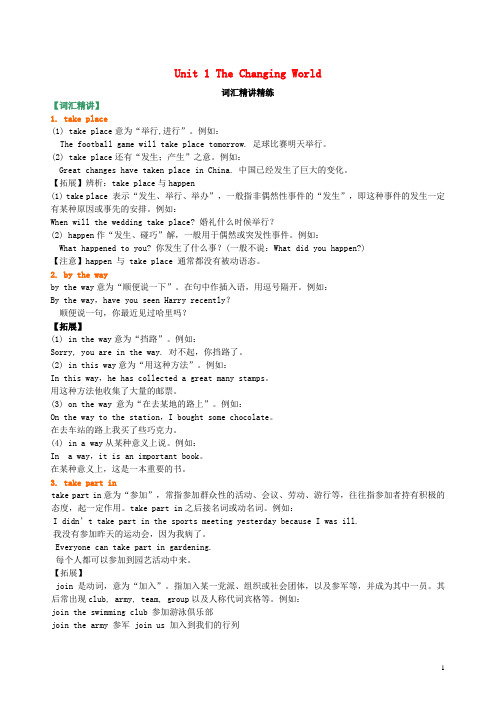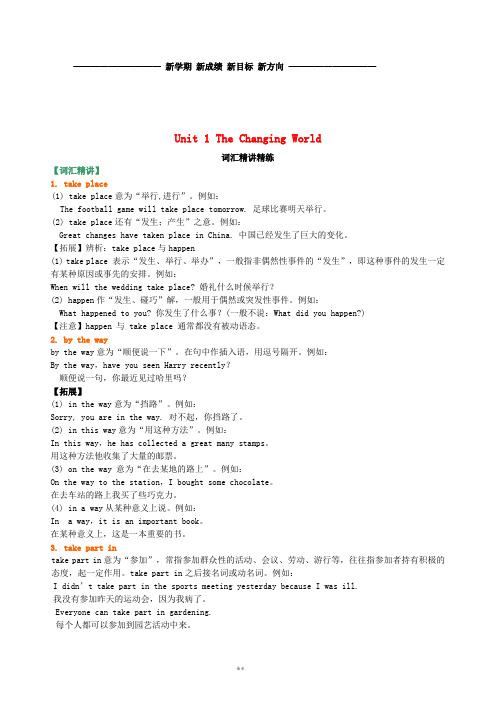[K12学习]九年级英语上册Unit1TheChangingWorld词汇精讲精练新版仁爱版
- 格式:doc
- 大小:48.00 KB
- 文档页数:8


2019-2020学年仁爱英语九年级上学期单词,词组,句子背默Unit 1 topic 1e back from 从……回来2.see ... oneself 亲眼目睹……3.take place 发生4.in the 1960s 在20世纪60年代5.find a proper place 找一个合适的地方6.living conditions 生活条件7.take photos 照相8.ring roads 环形路9.improve one’s English 提高某人的英语10.enjoy leisure activities 享受娱乐活动11.take part in 参加12.keep in touch with sb. 与……保持联系13.volunteer activities 志愿者活动14.far away 远离15.disabled children’s home 残疾儿童之家16.all / many sorts of ... 所有/许多种类17.learn a lot from ... 从……学到很多18.not only ... but also ... 不仅……而且……19.have no time to do sth. 没时间做某事20.modern schools 现代化的学校21.write an article about ... 写一篇关于……的文22.what’s more 更有甚者23.have / live a hard life 过着艰苦的生活24.made rapid progress 取得快速的进步25.describe sth. in detail 详细地描述某物26.succeed in doing sth. 成功做某事27.afford an education for .. 供得起……的教育28.dream about 梦想29.spend one’s childhood 度过某人的童年30.in the open air 在户外31.in order to do sth. 为了做某事32.go to the movie theater 去电影院33.support one’s family 供养家庭34.take exercise 体育锻炼35.child laborers 童工36.go roller skating 滑旱冰37.day and night 日日夜夜38.with the help of sb. 在某人的帮助下39.develop rapidly 发展迅速40.consider doing sth. 考虑做某事41.give support to sb. 给某人支持42.with the development of .. 随着……的发展43.write a composition 写一篇作文44.get/receive a good education 获得好的教育45.check over 检查46.have a/no chance to do sth. 有/没有机会做某事47.thanks to the government’s efforts 多亏政府的努力48.more than 多于三、1. Great change s have taken place there and my hometown has become more and more beautiful.那儿变化很大,而且我的家乡变得越来越美丽了。

Unit 1 The Changing World一重点短语1. come back from2. see sb. doing sth.3. feel sorry for4. take part in5. spend…(in) doing sth.6.tell story to sb.7. describe sth. in details8. what’s more9. by the way10. give support to sb.= give sb. support 11. search…for…12. have been to 13. with the develpoment of… 14. shout at ab.have gone to 15. divide …into… 16. be cruel for sb.17. work for sb. 18. take photos 19. learn…from…20. have no tome to do sth. 21. see sth. oneself 22. in recent years 23. make progress (with sth.) 24. at present 25. happen to sb./sth.26. in the future 27. thanks to happen to do sth.28. hate to do sth. 29. take place 30. have a hard life31. be strict with sb. 32. in the past 33. in order to do sth.be strict in sth. 34. study hard 35. get lost36. not only…but also… 37. one fifth/ two fifths 38. work well in…39. have/get a good chance to do sth. 40. get/ receive a good education 41. be short of42. be in trouble 43. return to 44. even though= even if45. both…and… 46. provide sb. with sth. 47. decide on sth.48. in fact 49. at home and abroad decide to do sth.50. hear of 51. be/feel satisfied with 52. at the same timehear from= get a letter from sb. 53. a couple of 54. feel good about oneself 55. get/be used to (doing) sth. 56. be successful inused to do sth. succeed inbe used to do sth.= be used for doing sth.57. buy sth. for sb. = buy sb. sth. 58. draw up 59. more than = over 60. keep in touch with. 61. far away less than62. sorts of = kinds of 63. be popular with sb. 64. take place65. with the help of sb./sth.= with sb’s help 66. better and better67. at least 68. at that time more and more beautiful69. because of 70. control the population 71. carry out72. take measures to do sth. 73. keep up with. 74. come for a visit 75. be known as= be famous as 76. aim to do sth. 77. in the past two years be famous for 78. lend sth. to sb.= lend sb. sth.borrow sth. from sb.二重点句型1. There goes the bell. 倒装句.2. Though I had no time to travel, I still felt vert happy.3. Parents couldn’t afford an edcation for their children.4. You have just come back from your hometown.Have you ever told stories to the disabled chidren?He says he has never seen such a beautiful place before.5. I can't go shopping in big stores unless I travel for a couple of hours.= I can’t go shopping in big stores if I don’t travel for a couple of hours.6. It trains them so that they can find jobs again.7. He has alredy gone home.Has he gone home yet?He hasn’t gone home yet.8. So do I. 我也是。

Unit 1 The Changing World词汇精讲精练【词汇精讲】1. take place(1) take place意为“举行,进行”。
例如:The football game will take place tomorrow. 足球比赛明天举行。
(2) take place还有“发生;产生”之意。
例如:Great changes have taken place in China. 中国已经发生了巨大的变化。
【拓展】辨析:take place与happen(1) take place 表示“发生、举行、举办”,一般指非偶然性事件的“发生”,即这种事件的发生一定有某种原因或事先的安排。
例如:When will the wedding take place? 婚礼什么时候举行?(2) happen作“发生、碰巧”解,一般用于偶然或突发性事件。
例如:What happened to you? 你发生了什么事?(一般不说:What did you happen?)【注意】happen 与 take place 通常都没有被动语态。
2. by the wayby the way意为“顺便说一下”。
在句中作插入语,用逗号隔开。
例如:By the way,have you seen Harry recently?顺便说一句,你最近见过哈里吗?【拓展】(1) in the way意为“挡路”。
例如:Sorry, you are in the way. 对不起,你挡路了。
(2) in this way意为“用这种方法”。
例如:In this way,he has collected a great many stamps。
用这种方法他收集了大量的邮票。
(3) on the way 意为“在去某地的路上”。
例如:On the way to the station,I bought some chocolate。

仁爱九年级上册Unit1: The changing worldTopic1 知识点一、重点短语和表达take place发生 so…that…如此…以至于… come back from…从…返回learn…from…从…学习… take part in参加 put on上演,穿上a group of一组,一群 keep in touch with sb和某人保持联系 far away远离reform and opening-up改革开放 medical care医疗服务 what’s more而且,更重要的是make progress取得进步 dream about梦想 play a part in…在…起作用/扮演角色in one’s spare time在某人的空闲时间 go abroad出国 in the past在过去二、重点句型be happy to do sth高兴做某事have (no) time to do sth (没)有时间做某事have (no) chance to do sth (没)有机会做某事三、重点语法---现在完成时1.定义:①表示动作从过去一直持续到现在;②在说话前已经发生或完成的动作对现在造成的影响。
2.结构:have/has + done(have/has+动词的过去分词)①肯定句:I have finished my homework already. 我已经完成了我的作业。
(对现在造成的影响:不用再做了)②否定句:I haven’t finished my homework yet. 我还没有完成我的作业。
③一般疑问句:---Have you finished your homework yet? 你已经完成你的作业了吗?---Yes, I have. / No, I haven’t. 是的,完成了。
/不,没有。
e.g. I have been to Mount Huang with my parents. 我曾和我的父母去黄山了。

——————————新学期新成绩新目标新方向——————————Unit 1 The Changing World词汇精讲精练【词汇精讲】1. take place(1) take place意为“举行,进行”。
例如:The football game will take place tomorrow. 足球比赛明天举行。
(2) take place还有“发生;产生”之意。
例如:Great changes have taken place in China. 中国已经发生了巨大的变化。
【拓展】辨析:take place与happen(1) take place 表示“发生、举行、举办”,一般指非偶然性事件的“发生”,即这种事件的发生一定有某种原因或事先的安排。
例如:When will the wedding take place? 婚礼什么时候举行?(2) happen作“发生、碰巧”解,一般用于偶然或突发性事件。
例如:What happened to you? 你发生了什么事?(一般不说:What did you happen?)【注意】happen 与 take place 通常都没有被动语态。
2. by the wayby the way意为“顺便说一下”。
在句中作插入语,用逗号隔开。
例如:By the way,have you seen Harry recently?顺便说一句,你最近见过哈里吗?【拓展】(1) in the way意为“挡路”。
例如:Sorry, you are in the way. 对不起,你挡路了。
(2) in this way意为“用这种方法”。
例如:In this way,he has collected a great many stamps。
用这种方法他收集了大量的邮票。
(3) on the way 意为“在去某地的路上”。
例如:On the way to the station,I bought some chocolate。
Unit 1 The Changing World Topic 3知识点汇编一、重点词汇(一)词形转换1. homeless(名词) homelessness 2.fair (反义词) unfair2. excited (动词) excite3. disobey (反义词) obey4. succeed (名词) success (形容词) successful5. French (国家) France (公民) Frenchman(二)重点短语1.help homeless people 帮助无家可归的人2.in need 需要(食物和钱)3.decide on (doing ) sth. 决定(做)某事4.provide sb. with sth. 给某人提供某物e for a visit 来参观;来看一看6.be successful in (doing) sth. 成功地做了某事7.get/find jobs 获得/ 找到工作8.feel good about oneself 自我感觉良好9.take drugs 吸毒10.give sb. a good chance to do sth. 给某人做某事的一次好机会11.end the war 结束战争12.live a happy life 过着幸福的生活13.smile on one’s face 脸上露出笑容14.Project Hopes 希望工程15.at home and abroad 在国内外16.in poor areas 在贫困地区17.receive a good education 受到良好的教育二、重点句型1.It trains them so that they can find jobs again. 培训他们以便他们能再次找到工作。
2.I think it is important for these people to feel good about themselves.我认为对于这些人来说自我感觉良好是很重要的。
仁爱版英语九年级上册Unit 1 The Changing WorldTopic 3 The world has changed for the better.【重点单词】1.block /blɑːk/;/blɒk/ n. 街道(区);(方形平面)大块2.artist /ˈɑːtɪst/ n. 艺术家,(尤指)画家3.visitor /ˈvɪzɪtə(r)/ n. 游客;来访者;参观者4.industry /ˈɪndəstri/ n. 行业;工业5.chemistry /ˈkemɪstri/ n. 化;化学物质6.term /tɜːm/ n. 学期;词语;措辞7.program /'prəʊɡræm/ n. 计划,方案;节目8.homeless /ˈhəʊmləs/ adj. 无家的9.manage /ˈmænɪdʒ/ v. 完成(困难的事);能解决(问题)10.treatment /ˈtriːtmənt/ n. 疗法,治疗11.immediately /ɪˈmiːdiətli/ adv. 立刻,立即conj. 一……就,即刻12.secretary /ˈsekrəteri/;/ˈsekrətri/ n. 秘书13.helper /ˈhelpə(r)/ n. 帮手,助手14.club /klʌb/ n. 俱乐部15.engineer /ˌendʒɪˈnɪə(r)/ n. 工程师,设计师16.wound /wuːnd/ n. 创伤;伤口17.basic /ˈbeɪsɪk/ adj. 基本的, 基础的18.human /ˈhjuːmən/ adj. 人的n. 人19.value /ˈvæljuː/ v. 重视,珍视n. 价值20.period /ˈpɪəriəd/ n. 一段时间,时期21.shelter /ˈʃeltə(r)/ n. 收容;遮蔽物22.homelessness /hoʊmləsnəs/ n. 无家可归23.earn /ɜːn/ v. 挣钱;挣得,赢得24.drug /drʌɡ/ n. 毒品;药,药物25.mental /ˈmentl/ adj. 精神健康的;思想的26.whatever /wɒtˈevə(r)/ pron. 无论什么,不管什么;任何事物27.effect /ɪˈfekt/ n. 影响,结果;效果28.steal /stiːl/ v. 偷,窃取29.suppose /səˈpəʊz/ v. 帮助,援助;支持30.phrase /freɪz/ n. 短语,词组31.according /ə'kɔːdɪŋ/ to 据……所说,按……所报道32.context /ˈkɒntekst/ n. 上下文;语境;背景borer /'leɪbərə/ n. 体力劳动者,劳工, 工人34.cruel /ˈkruːəl/ adj. 残酷的,冷酷的35.project /ˈprɒdʒekt/ n. 专题研究;项目;方案36.aid /eɪd/ v.&n. 援助;帮助37.primary /ˈpraɪməri/ adj. 小学教育的;主要的;最初的38.contribution /ˌkɒntrɪˈbjuːʃn/ n. 贡献;捐款39.encourage /ɪnˈkʌrɪdʒ/ v. 鼓励40.moral /ˈmɒrəl/ adj. 道德(上) 的41.development /dɪˈveləpmənt/ n. 发展,开发42.respect /rɪˈspekt/ v. 尊敬,尊重43.importance /ɪmˈpɔːtns/ n. 重要性,重要44.continue /kənˈtɪnjuː/ v. 持续,继续做45.college /ˈkɒlɪdʒ/ n.(美国)大学;(英国)学院【重点短语】1.get used to 习惯于ed to 过去常常3.as a matter of fact 事实上,其实4.provide sb with sth 为某人提供某物5.a short period of time 很短的一段时间6.be able to do sth 能够做某事lions of 大量的;数以百万计8.earn money 赚钱9.have a problem with sth 在某方面有问题10.on purpose 故意,有意地11.make a contribution to 为……做贡献12.as a result 结果是,因此【重点句型】1.How do you like living there?你觉得住在那里怎么样?2.Oh, you will get used to it soon if you come.。
Unit 1 The Changing World词汇精讲精练【词汇精讲】1. take place(1) take place意为“举行,进行”。
例如:The football game will take place tomorrow. 足球比赛明天举行。
(2) take place还有“发生;产生”之意。
例如:Great changes have taken place in China. 中国已经发生了巨大的变化。
【拓展】辨析:take place与happen(1) take place 表示“发生、举行、举办”,一般指非偶然性事件的“发生”,即这种事件的发生一定有某种原因或事先的安排。
例如:When will the wedding take place? 婚礼什么时候举行?(2) happen作“发生、碰巧”解,一般用于偶然或突发性事件。
例如:What happened to you? 你发生了什么事?(一般不说:What did you happen?)【注意】happen 与 take place 通常都没有被动语态。
2. by the wayby the way意为“顺便说一下”。
在句中作插入语,用逗号隔开。
例如:By the way,have you seen Harry recently?顺便说一句,你最近见过哈里吗?【拓展】(1) in the way意为“挡路”。
例如:Sorry, you are in the way. 对不起,你挡路了。
(2) in this way意为“用这种方法”。
例如:In this way,he has collected a great many stamps。
用这种方法他收集了大量的邮票。
(3) on the way 意为“在去某地的路上”。
例如:On the way to the station,I bought some chocolate。
Unit 1 The Changing World Topic 2知识点汇编一、重点词汇(一)词形转换1. possible (反义词) impossible2. rise (过去分词) rose3. conclude (名词) conclusion4. medicine (形容词) medical5. difficult (名词) difficulty6. less (反义词) more7. excellent (近义词) great/ good8. different (名词) difference9. come (过去式) came (过去分词) come 10. see (过去式) saw (过去分词) seen 11. peace (形容词) peaceful(二)重点短语1. get lost 走失;迷路2.hate to go shopping 讨厌去购物3.hear from sb.=receive/ get a letter from sb. 收到某人的来信4.be abroad 在国外5.at least 至少6.take place = happen 发生7.China’s one-child policy 中国的独生子女政策8.be strict with sb. 对某人要求严格9.the population of China 中国的人口10.live longer 活得更长11.medical care 医疗保健12.control the population 控制人口13.be known / famous as 以……而闻名14.work well in doing sth. 在做某事方面很有功效15.have a long way to go 有很长的路要走16.be short of 缺乏……17.one of the greatest problems 最大的问题之一18.be in trouble 陷入麻烦中/ 在困境中19.prefer boys to girls 重男轻女20.offer sb. a good education 提供某人良好的教育21.a couple of 一些 ;几个22.even though = even if 即使23.have a lot of pressure 有许多压力24.the differences between A and B A与B之间的区别一、重点句型1. We got lost and couldn’t find each other.我们走失了,互相找不到对方。
Unit 1 The Changing World词汇精讲精练【词汇精讲】1. take place(1) take place意为“举行,进行”。
例如:The football game will take place tomorrow. 足球比赛明天举行。
(2) take place还有“发生;产生”之意。
例如:Great changes have taken place in China. 中国已经发生了巨大的变化。
【拓展】辨析:take place与happen(1) take place 表示“发生、举行、举办”,一般指非偶然性事件的“发生”,即这种事件的发生一定有某种原因或事先的安排。
例如:When will the wedding take place? 婚礼什么时候举行?(2) happen作“发生、碰巧”解,一般用于偶然或突发性事件。
例如:What happened to you? 你发生了什么事?(一般不说:What did you happen?)【注意】happen 与 take place 通常都没有被动语态。
2. by the wayby the way意为“顺便说一下”。
在句中作插入语,用逗号隔开。
例如:By the way,have you seen Harry recently?顺便说一句,你最近见过哈里吗?【拓展】(1) in the way意为“挡路”。
例如:Sorry, you are in the way. 对不起,你挡路了。
(2) in this way意为“用这种方法”。
例如:In this way,he has collected a great many stamps。
用这种方法他收集了大量的邮票。
(3) on the way 意为“在去某地的路上”。
例如:On the way to the station,I bought some chocolate。
在去车站的路上我买了些巧克力。
(4) in a way从某种意义上说。
例如:In a way,it is an important book。
在某种意义上,这是一本重要的书。
3. take part intake part in意为“参加”,常指参加群众性的活动、会议、劳动、游行等,往往指参加者持有积极的态度,起一定作用。
take part in之后接名词或动名词。
例如:I didn’t take part in the sports meeting yesterday because I was ill.我没有参加昨天的运动会,因为我病了。
Everyone can take part in gardening.每个人都可以参加到园艺活动中来。
【拓展】join是动词,意为“加入”。
指加入某一党派、组织或社会团体,以及参军等,并成为其中一员。
其后常出现club, army, team, group以及人称代词宾格等。
例如:join the swimming club 参加游泳俱乐部join the army 参军 join us 加入到我们的行列4. enough(1)enough是形容词,意为“充足的,充分的,足够的”,可作表语或定语,作定语时,可放在名词的前面。
例如:The food is enough for the trip.用于这次旅行的食物足够了。
I have enough time to watch TV.我有足够的时间看电视。
(2)enough还可作副词,意为“足够的”,这时enough需放在所修饰的形容词或副词后面。
例如:The young man is strong enough to carry the heavy bag.那个年轻人足够强壮能搬动重包。
【拓展】(1)There be enough…“有足够的……”。
例如:There aren’t enough seats for all the people to sit down.没有足够的座位能让所有的人坐下。
(2)enough…to do sth. “有足够的……做某事”。
例如:I don’t have enough t ime to eat lunch.我没有足够的时间吃午饭。
(3)enough to do…可以同too…to…或so…that…结构互相转换。
例如:He isn’t old enough to go to school. = He is too young to go to school.= He is so young that he can’t go to school.他太小而不能上学。
5. fewfew为形容词,意为“不多,很少”,只能与可数名词搭配,表示“几乎没有”,自身有否定含义。
也常与不定冠词a组成词组a few,表示“有一点”,有肯定含义。
例如:He has few friends. 他几乎没朋友。
May I ask a few questions? 我可以问几个问题吗?【拓展】辨析:few/a few; little/a little(1) few/a few只能用来修饰可数名词,few表示否定,意为“没有,几乎没有”;a few表示肯定,意为“有几个,有一些”。
例如:He has few friends here, he feels lonely.他这里没朋友,他感觉寂寞。
There are a few eggs in the basket.篮子里有几个鸡蛋。
(2) little/a little只能用来修饰不可数名词,little表示否定,意为“没有,几乎没有”;a little 表示肯定,意为“有一点,有一些”。
例如:There is little ink in my bottle,can you give me a little ink?我的瓶子里没有墨水了,你能给我点儿墨水吗?6. succeedsucceed 表示“成功”,是不及物动词; succeed 后通常接in doing sth,表示做某事做成功了。
例如:His plan succeeded.他的计划成功了。
At last he succeeded in solving the problem.他终于把那个问题解决了。
She succeeded in (passing) the exam. 她考试及格了。
【拓展】(1) success 表示抽象意义的“成功”,是不可数名词;表示具体意义的“成功的人或事”, 则是可数名词。
例如:Failure is the mother of success. 失败是成功之母。
His new book was a great success.他新出版的书获得了巨大成功。
(2) successful作形容词,意为“成功的”。
例如:The performance was successful. 演出很成功。
It was a successful experiment. 那是一次成功的试验。
7. everever是副词,意为“曾经,总是,在任何时候”。
其用法如下:(1) 用于肯定句中,表示“曾经,总是”,加强语气。
例如:He is ever repeating the same words.他总是重复同样的话。
(2) 用于一般疑问句、否定句或条件从句中,表示“曾经,从来,在任何时候”。
例如:Do you ever wish you were rich? 你曾经希望自己很富有吗?(3) 用在特殊疑问词之后,加强语气,含“究竟、到底”之意。
例如:Where ever do you want to go? 你究竟想去哪里?(4) 用于比较级中,置于than之后,表示“以前,以往”。
例如:It’s ra ining harder than ever. 雨比以前下得更大了。
【拓展】already; ever与yet的辨析:(1) already是副词,意为“已经”,与现在完成时连用,通常用于肯定句。
例如:I have already seen the film. 我已经看过这部电影了。
(2) ever是副词,意为“曾经”。
常与现在完成时连用,还可用于疑问句、否定句、比较级和最高级之后。
例如:Have you ever been to Beijing?你曾经去过北京吗?My younger brother studied harder than ever. 我弟弟比以前学习更用功了。
(3) yet是副词,意为“已经”,与现在完成时连用,用于疑问句或否定句中,通常置于句末,也可以与not连用。
not yet常用来简略回答完成时态的一般疑问句,意为“还没有”。
例如:— Has the train started yet? 火车已经开了吗?— Not yet. 还没有。
8. populationpopulation意为“人口”时,是一个集体名词,被看作一个整体,在句中作主语时,后面的谓语动词用单数形式。
例如:China has a quarter of the world’s population. 中国人口占世界人口的四分之一。
【拓展】(1) 当表示一个城市、地区或国家有多少人口时,常用以下两种结构,即“the population of + 某地+ is + 数词”或“某地 + has a population of + 数词”。
例如:The population of London is over ten million. =London has a population of over ten million. 伦敦的人口超过一千万。
(2) population可与large,small搭配,但不能与many,few搭配。
例如:The city with its large population has become crowded.这个人口众多的城市变得拥挤不堪了。
(3) 询问人口数量常用what或how large。
例如:What’s the population of the city? =How large is the population of the city?这个城市有多少人口?(4) population前有修饰词,如分数、百分数时,表示整体人口中的一部分,谓语动词用复数形式。
例如: One half of the population of the city are farmers. 这个城市的一半人口是农民。
9. offer(1) 作动词,意为“给予,提供(有主观上愿意供给的意思)”。
例如:He offered me a glass of wine. 他端给我一杯酒。